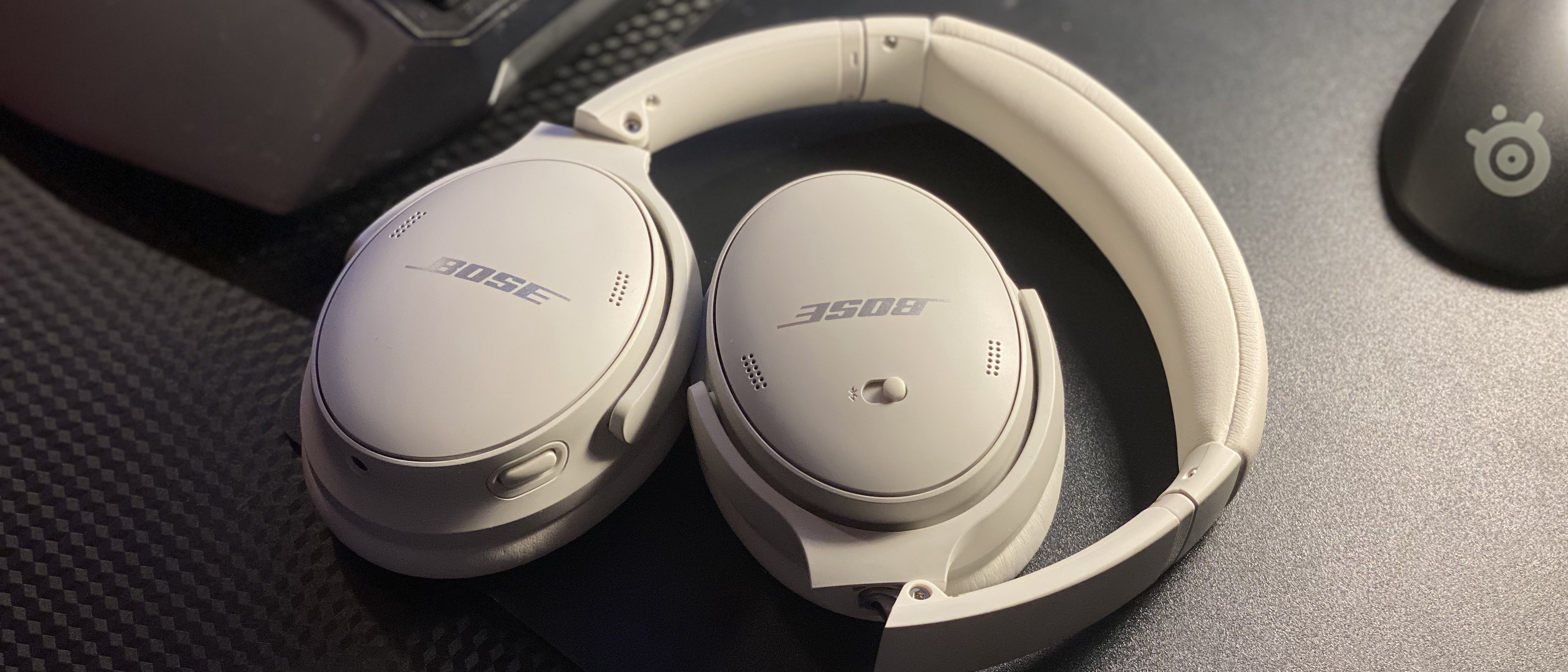TechRadar Verdict
The Bose QuietComfort 45 are a strong successor to the company’s 2019 flagship model, the Bose QuietComfort 35 II, and yet don’t quite have the refinement of last year’s Bose Noise Cancelling Headphones 700. The QC45 are missing a few features like adjustable noise reduction and their audio performance isn’t audiophile-quality. They’re comfortable for long periods of time, however, and are easy enough for anyone to use, which is enough to get them a tepid recommendation.
Pros
- +
Fantastic noise cancellation
- +
Intuitive control scheme
- +
Lightweight and comfortable
- +
New ambient aware mode
Cons
- -
Missing a few features
- -
Lackluster clarity
- -
Call quality isn’t great
- -
Occasional dropout
Why you can trust TechRadar
One-minute review
The Bose QuietComfort 45 are a rock-solid pair of noise-cancelling headphones. They’re easy-to-use and feel incredibly comfortable to wear for long periods of time. Those are traits that Bose has always been known for and they continue to live on here.
Of course, the QC45 aren’t without a few new tricks. Among them are an Ambient Aware mode that allows you to hear sounds around you at the press of a button as well as upgraded noise cancellation tech that’s more responsive than before.
On top of that you’ve got a good-but-not-great battery life of 25 hours and a beam-forming microphone array that is, well, not quite as good as we had hoped. Neither of these are deal-breakers, but they do make the Bose QuietComfort 45 slightly less appealing than some of its competitors.
In fact, the Bose QuietComfort 45’s biggest issues aren’t anything that they do wrong - there are minor issues, but nothing absolutely awful - and instead they have everything to do with two other amazing headphones out there: the Sony WH-1000XM4 and Bose Noise Cancelling Headphones 700. Both offer more customization options, better sound, and present a better value for just a little bit more cash.
However, the Bose QuietComfort 45 are still a solid option and are one of our top recommendations in our best wireless headphones guide. Read on for our full Bose QuietComfort 45 review.
[Update: The Bose QuietComfort 45 now come with an adjustable equalizer. This means you can set the bass, mid-range, and treble levels of the headphones to your personal preferences, or choose from one of several preset options. To access the adjustable EQ feature, simply update the QC45 headphones firmware by opening the Bose Music app, tapping “Install Update” on the QC45 control screen, and following the prompts on your screen.]
Price and release date
The Bose QuietComfort 45 became available on September 23, 2021 and cost $329 / £329 / AU$499.95, depending on where you live.
That’s on the expensive side for noise cancelling headphones – as some can be had for as little as $100 / £100 / AU$200 – but this isn’t unreasonable for Bose as the QuietComfort 35 II cost $350 / £330 / AU$500. Also, there are Bose promo codes around to help you pay less.
At this price point, the biggest competition for the Bose QC45 is the similarly spec’d Sony WH-1000XM4, which we currently consider to be the best noise-cancelling headphones, and Bose’s own Noise Cancelling Headphones 700 that aren’t much more expensive. The WH-1000XM4 have a few features the QC45 do not – like the DSEE Extreme audio upscaler and support for the LDAC codec – while the NC700 offer adjustable noise cancellation, one major missing feature on the QuietComfort 45.
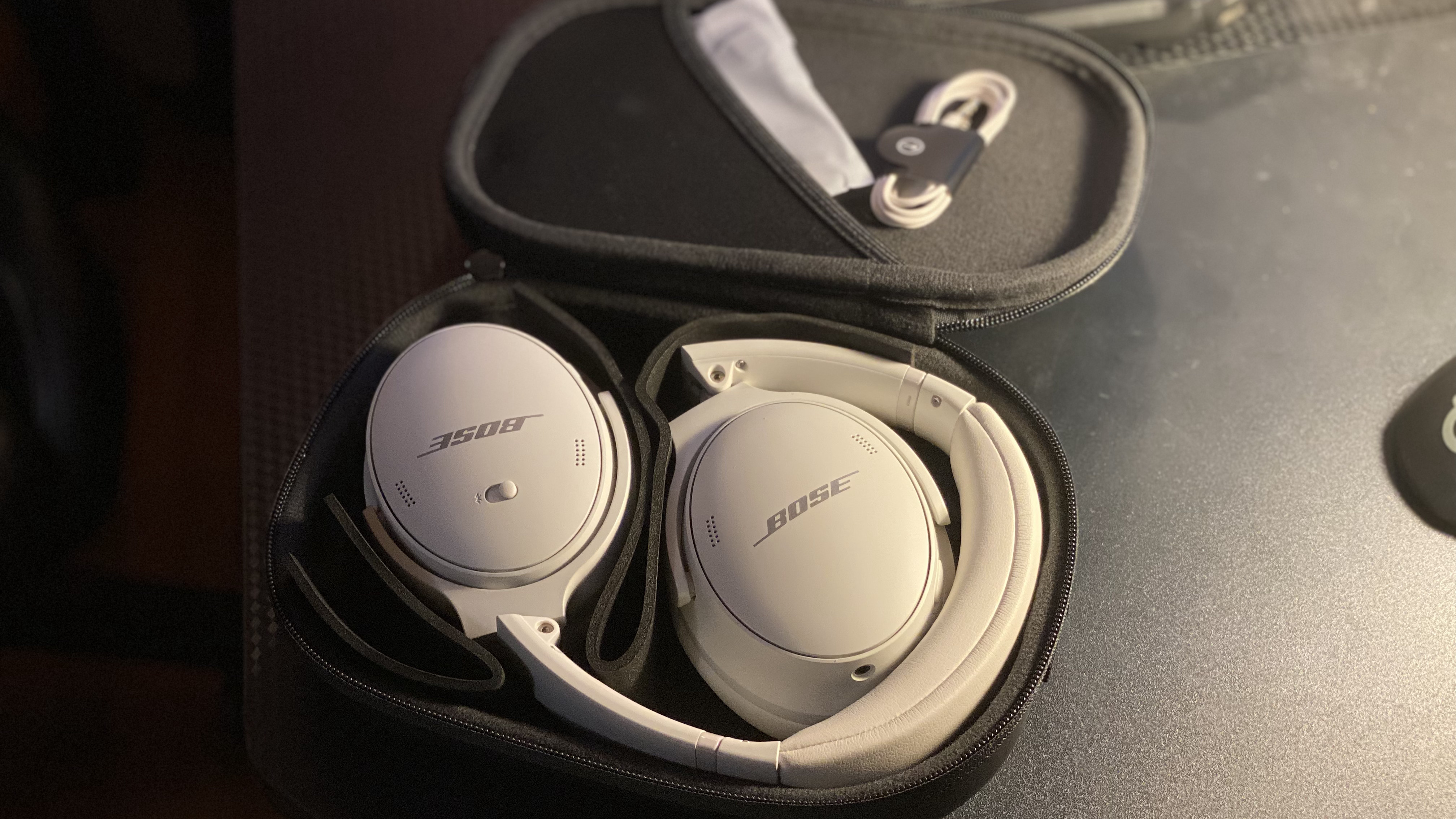
Design
Bose has kept a consistent design with its flagship headphones for the better part of the last decade, and that hasn’t changed with the QC45.
The exterior of the headphones looks sleek and feels comfortable thanks to its padded foam bridge and faux-leatherette ear pads. The pads themselves swivel and fold to help them fit into the included carrying case, which makes them easy to throw in your carryon bag when they’re not around your neck.
What’s surprising about the design is how light they are – at just 8.5 ounces (238g), they really feel light on the ear and are comfortable to wear for hours on end. To get them so light, Bose uses some plastic on the arms of the headphones but uses metal for all the joints and the bridge - basically all the parts that are most likely to snap in use.
To control playback, Bose has equipped the QC45 with a number of intuitive buttons. On the right earcup you’ve got controls for pause/play, volume up and volume down, while on the left earcup you’ll find a button for the new ambient aware mode. You can also summon your phone’s built-in assistant by holding the play/pause button, which is nice. It’s not as nice as having an always listening assistant built into the headphones, but better than not having an option for an assistant at all.
Last but not least, you’ll find two main ports on the headphones: there’s a 2.5mm audio jack on the bottom of the left earcup and a USB-C port on the bottom of the right earcup. Both ports are fairly self-explanatory – but it’s still nice to see them as opposed to, say, MicroUSB and no headphone jack at all.
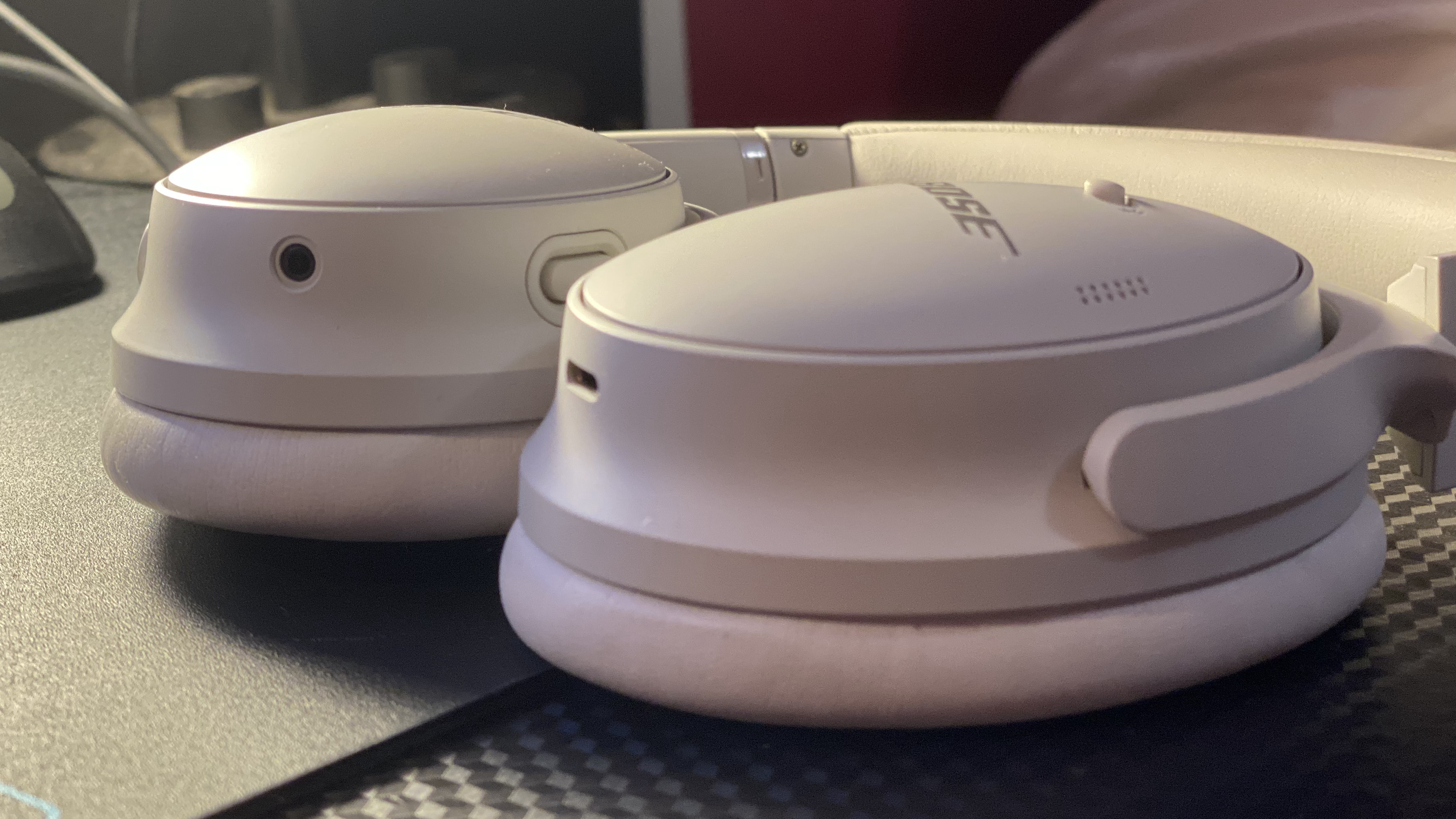
Features
On the features front, things are a bit more disappointing. The big new obvious draw here is Awareness Mode that allows you to significantly lower the volume of your music and turn off noise cancellation without taking off the headphones. If this sounds familiar, it’s what Sony’s offered on its noise cancelling headphones for the last few years and it’s nice to finally see it on a pair of Bose cans.
So how does it work in practice? It’s just OK. The QC45 don’t do a great job of using the external microphones to amplify outside audio, and more or less just turn off the noise cancellation technology. That means announcements or conversations that are happening further away are still kind of hard to hear - or at least not as easy to hear as they would be if Bose amplified them using the external microphones.
The other major missing features here are the ability to change the strength of noise cancellation - though a recent updates means you can now change the tuning of audio playback via an EQ.
Finally, it would’ve been nice to have a built-in virtual assistant like Alexa or Google here. You’ll still be able to use your phone’s assistant by long-pressing the play/pause button, but an always-listening assistant is great when you’ve got your hands full.
Performance
The Bose QuietComfort 45’s sound performance is also a double-edged sword. On one hand, these are definitely not the bassiest or detail-rich pair of over-ear headphones we’ve ever heard. On the other hand, though, they are one of the most listenable pairs of headphones among the ones we’ve tested thanks to Bose’s smart design choices.
One such example of that is the QC45’s distinct lack of bass response. Songs like Bad Guy by Billie Eilish don’t have much power behind that driving bass line that other headphones have, nor do they have a richness and clarity in the upper registers. That means details in both areas are hard to hear and less impactful compared to other over-ear headphones.
That said, it wouldn’t surprise us if Bose tuned them that way on purpose as both areas can quickly become fatiguing if not properly done. To prove that point, there are a number of bass-heavy headphones out there that are certainly fun to listen to, but they’re not great on flights when any extra pressure can feel uncomfortable. The same is true for hyper-clear headphones that excel at critical listening – they’re fun at home, but not great on the road.
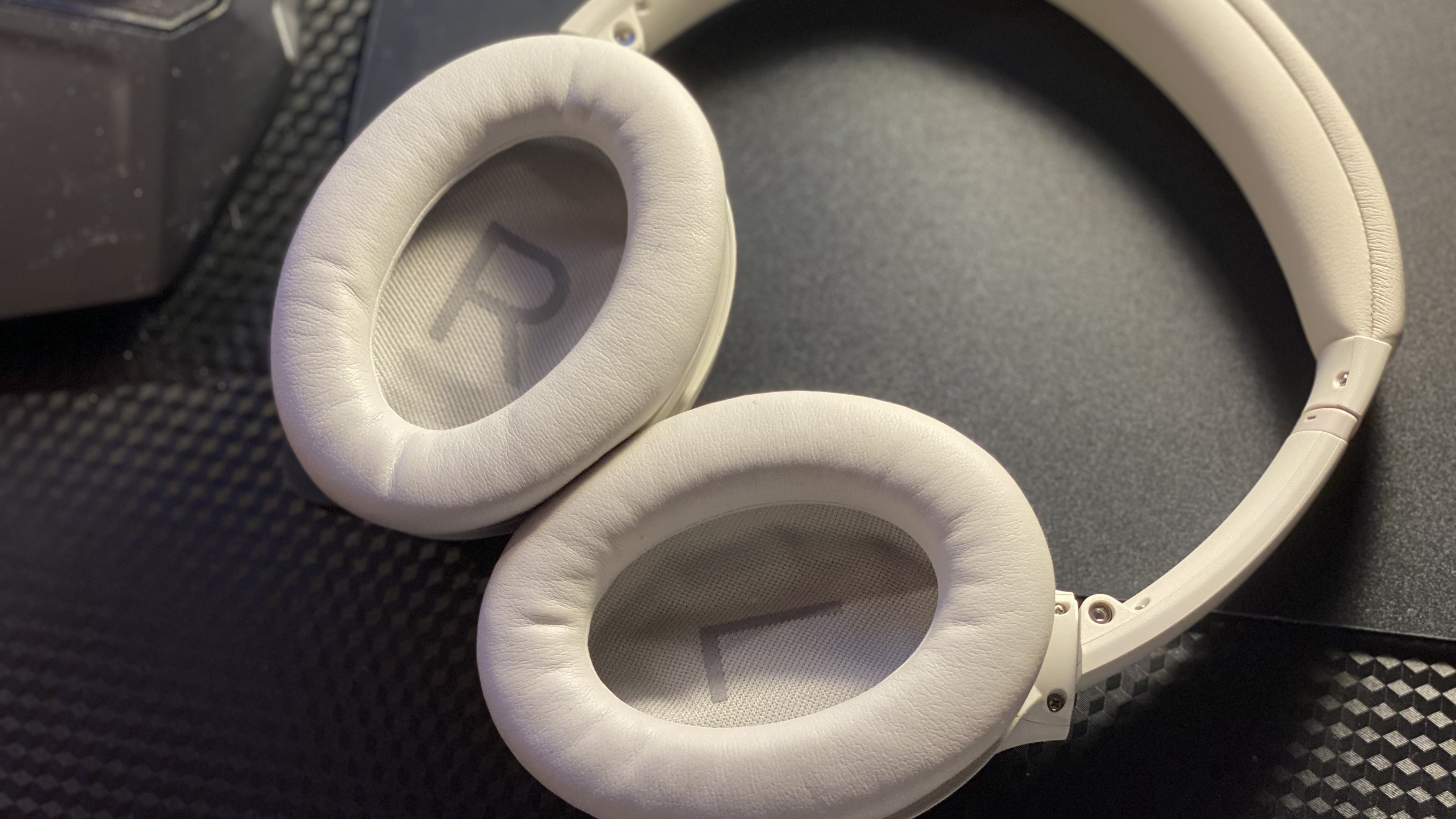
The other performance issues we experienced were occasional dropouts in connection and less-than-ideal call quality. This happened several times with the Amazon Prime Music app – unsurprising as the app can be a little unstable – but also once or twice when listening to videos on YouTube, an app that has always been rock-solid in the past. As for the call quality, many of the folks we spoke to said it sounded like we were on speaker phone when we used the headphones. They reported that we sounded loud, but not necessarily clear.
The good news? So far, we’ve yet to be disappointed with their noise cancellation performance. Just wearing them around the house blocks out those annoying everyday distractions – there’s no noise from the AC unit or laundry room, and conversations happening elsewhere don’t interfere at all with the music we’ve got playing.
To get the best noise cancelling experience, it’s important to have some music playing at a moderate volume rather than, say, a podcast or meditation that has breaks in between dialogue where outside noise can leak in. Keep the music playing and you shouldn’t be able to hear outside conversations, dull rumbling noise or, well, pretty much anything.
Battery life
According to Bose, the QC45 have a class-leading battery life of 25 hours, which we’ve found to be just about accurate over our two week testing period. Our sample unit took a number of days to get to under 40% despite listening to them for four or more hours every single day.
That being said, however, they’re not quite as class-leading as Bose wants you to believe. The Sony WH-1000XM4 are good for around 30 hours of playback with noise cancellation on and up to 38 hours with ANC turned off. Both headphones have more than enough juice to get you across the ocean and back, but Sony still has Bose beat in overall battery life.
Thankfully, when the battery runs out, the Bose QC45 has quick charging that refills three hours’ worth of battery in just 15 minutes, allowing you to charge them in the morning before you head out the door and still make it to the office and back.
Should you buy the Bose QuietComfort 45 Headphones?
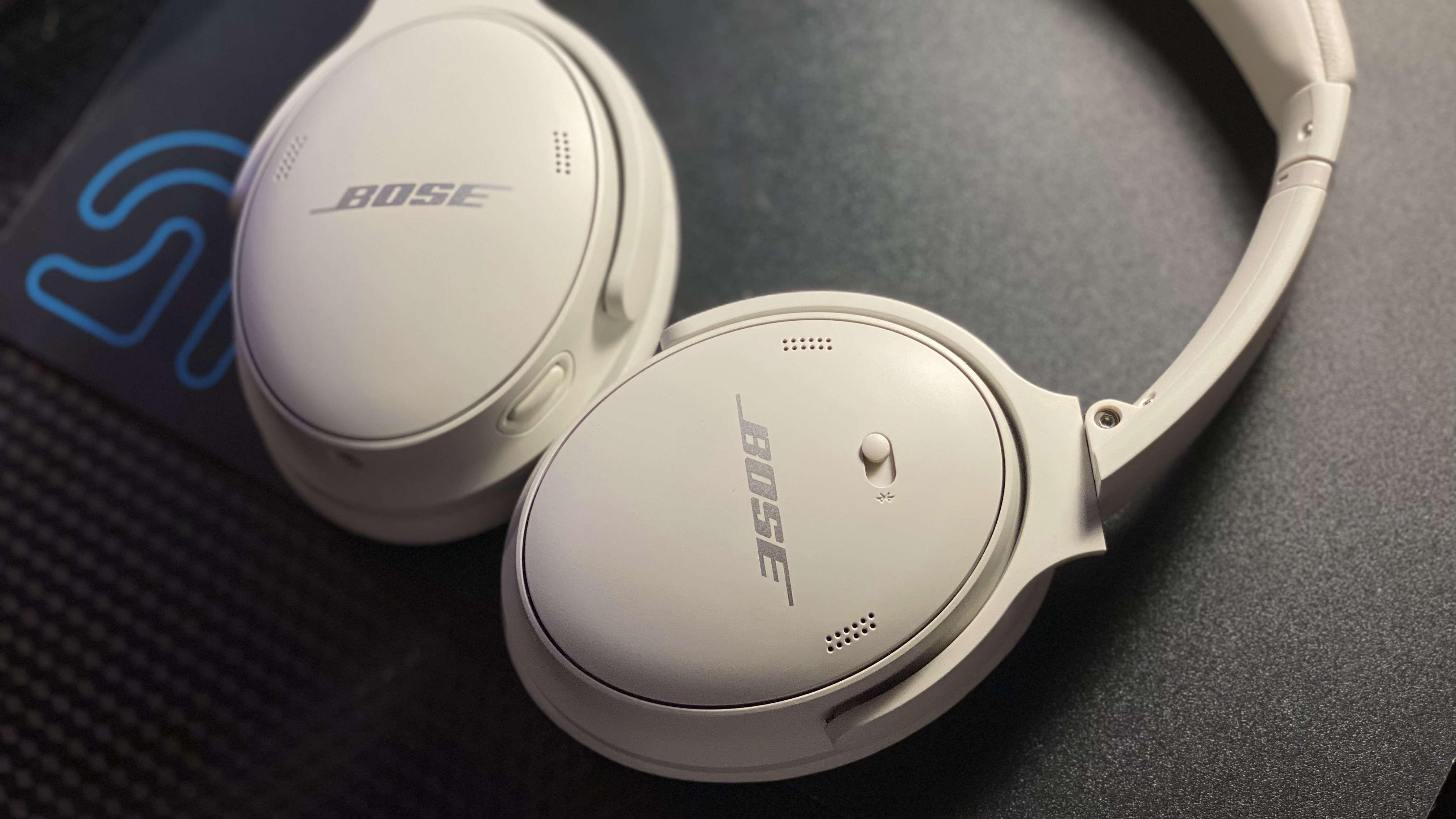
Buy them if...
You want something that’s comfortable to wear for long periods
Whatever faults we found with their audio replication and playback, we consistently found the QC45 to be incredibly comfortable to wear and listen to for extended periods. They lasted the whole work day on our ears without becoming overbearing, and they’re definitely our recommendation if you prefer a very mellow, subdued sound.
You’re looking for long-lasting headphones
While the Bose QC45 aren’t quite the longest lasting pair of headphones out there in the market, they do have a much longer battery life than most other noise-cancelling headphones at around 25 hours.
You’re a Bose QuietComfort 35 or 25 owner in need of an upgrade
By keeping the Bose QuietComfort 45 so similar to the 35 and 25 in terms of design and aesthetics, upgrading from either of Bose’s older headphones is a painless process. You’ll likely know where all of the buttons are and how they work, and now you’ve got some new features to play around with as well.
Don't buy them if...
You can afford the Bose NC700 or Sony WH-1000XM4 instead
The Bose QC45 are definitely in the same league as the NC700 and Sony WH-1000XM4, but not quite as good as either from our testing. We’d still recommend either Bose’s flagships from last year or the WH-1000XM4 if your budget can just stretch a little further.
You’re looking for better audio reproduction and call quality
No pair of noise cancelling headphones are going to be the be-all, end-all when it comes to audio reproduction, but the Bose QC45 have a softer sound quality than most. That makes them easy to listen to, but it never feels like you’re getting the most out of your music while wearing them. Similarly the call quality, while acceptable, could use a bit more work.
Cutting-edge features are important to you
We put this last because Bose can still fix this via a firmware update.The lack of features like control over the strength of the noise cancellation aren’t isn't a deal-breaker, but their absence is fairly painful when you know they exist on a model one step higher in the lineup.
- Looking for a new pair of cans? Check out our guide to the best headphones
Nick Pino is Managing Editor, TV and AV for TechRadar's sister site, Tom's Guide. Previously, he was the Senior Editor of Home Entertainment at TechRadar, covering TVs, headphones, speakers, video games, VR and streaming devices. He's also written for GamesRadar+, Official Xbox Magazine, PC Gamer and other outlets over the last decade, and he has a degree in computer science he's not using if anyone wants it.
